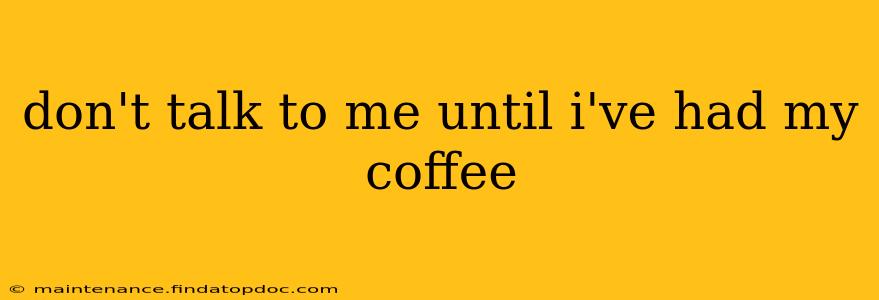Don't Talk to Me Until I've Had My Coffee: The Science and Societal Impact of Caffeine
Ah, the universal plea, "Don't talk to me until I've had my coffee." It's a sentiment shared by millions, a testament to the powerful role caffeine plays in our daily lives. But what's behind this relatable morning ritual? Let's delve into the science and societal impact of that crucial first cup.
What Happens When We Don't Have Coffee?
This seemingly simple question gets to the heart of caffeine's effects. Without our morning coffee (or tea, or other caffeinated beverage), our bodies experience a withdrawal. This withdrawal manifests in various ways, from grogginess and fatigue to headaches and difficulty concentrating. These symptoms are a direct result of our brains adjusting to the absence of caffeine, a stimulant that affects neurotransmitters like adenosine. Adenosine promotes relaxation and sleepiness; caffeine blocks its receptors, thus keeping us alert. The sudden absence of this blockage leads to the unpleasant effects of withdrawal.
Is it Really Addiction?
Many wonder if their daily coffee habit constitutes addiction. While the definition of addiction is complex and often debated, caffeine withdrawal symptoms are undeniable. The body's physiological response to caffeine's absence suggests a degree of dependence. However, it's crucial to distinguish between dependence and addiction. Dependence indicates that the body has adapted to the presence of caffeine and experiences withdrawal symptoms upon cessation. Addiction, on the other hand, implies a compulsive behavior despite negative consequences. For most people, a moderate caffeine intake doesn't qualify as addiction, but uncontrolled consumption can indeed lead to problems.
How Much Coffee is Too Much?
The "safe" amount of caffeine varies greatly depending on individual factors such as weight, metabolism, and overall health. Generally, most health organizations recommend limiting caffeine intake to around 400 milligrams per day, roughly equivalent to four cups of brewed coffee. However, exceeding this limit can result in anxiety, insomnia, heart palpitations, and digestive issues. It's crucial to listen to your body and adjust your consumption accordingly.
Are There Health Benefits to Coffee?
Beyond the immediate alertness, coffee consumption has been linked to several potential health benefits. Studies suggest it may reduce the risk of certain diseases like type 2 diabetes and some types of cancer. However, it's important to remember that these are correlations, not causations. Coffee's potential health benefits are often intertwined with other lifestyle factors, making it challenging to isolate the effects of coffee alone. Always consult a healthcare professional for personalized advice regarding caffeine intake and its potential impact on your health.
What are the Alternatives to Coffee?
If you're looking to reduce your caffeine intake or explore alternatives, many options exist. Tea, for example, contains caffeine but generally in lower amounts than coffee. Decaffeinated coffee and tea provide the flavor and ritual without the caffeine kick. Other options include herbal infusions, which offer a wide variety of flavors and potential health benefits without caffeine. Ultimately, finding the right alternative depends on individual preferences and needs.
The morning coffee ritual is far more than just a beverage; it's a deeply ingrained societal habit interwoven with our biology. Understanding the science behind caffeine's effects allows us to appreciate both its benefits and potential drawbacks, fostering a healthier and more informed approach to our daily caffeine consumption. So, go ahead and enjoy that coffee – but maybe try to avoid talking until after you've finished it!
